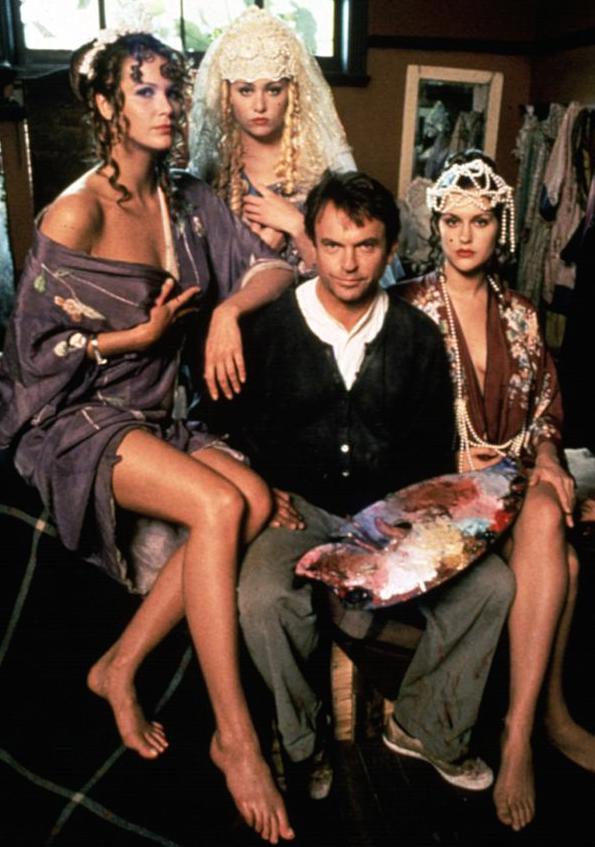Sunday, March 27, 1994.
SIRENS. Inspired by the life and times of Norman Lindsay (1879-1969). Music by Rachel Portman. Written and directed by John Duigan. Running time: 94 minutes. Restricted entertainment with the B.C. Classifier’s warning: some nudity, suggestive scenes and very coarse language.
THE MOMENT IS MYTHIC.
A darkly beautiful woman — Andromeda? — stands atop a rocky cliff above the sea. Her back is against a tree; her hands are bound together behind her.
A ruggedly handsome man — Perseus? — climbs the bluff towards her. Though he is blind, he senses her presence and reaches out to touch her.
"Please," she says through her fear. "Untie me."
The place is rural Australia, circa 1930. The woman, a demure Church of England vicar's wife named Estella Campion (Tara Fitzgerald), is undergoing what genteel film publicists call a "sensual awakening."
Estella's story could be compared to 1984’s A Passage to India. Genteel critics might liken her experience to Adela Quested's visit to the Marabar caves.
Since I'm not feeling particularly genteel this morning, I'll tell you that writer-director John (Flirting) Duigan's Sirens is a rude, cheerfully intelligent sex comedy.
It's the story of a bright young woman who gets all hot and bothered during a visit with some other young women who turn out to have fewer inhibitions and a lot more fun than she does.
The encounter takes place in and around the home of controversial Aussie artist Norman Lindsay (Sam Neill), an iconoclast in trouble with the Sydney establishment for submitting a "blasphemous" etching for exhibition to the public.
Estella's husband, Anthony (Hugh Grant), is the young clergyman dispatched to persuade the artist to behave himself. During their stay, Estella falls under the spell of Lindsay's attractive, outspoken models, Sheela (Elle Macpherson), Pru (Kate Fischer) and Giddy (Portia De Rossi), posing for Lindsay's version of Ulysses and the Sirens.
A gifted, insightful filmmaker, Duigan provides enough literate discourse and social commentary to maintain his standing among serious cineastes. His feature has cultural texture to burn.
(Why, for example, does he name his central character “Campion”? Could he be twitting fellow antipodean Jane Campion, director of 1993’s The Piano and a serious artistic advocate of sexual liberation?)
Cheeky and playful in the manner of the best Aussie features, Sirens takes an undergraduate delight in its own wit, winking as it slips in yet another symbolic serpent, or artistically necessary nude scene. Not only is Duigan a first-class entertainer, he's an equal opportunity employer.
That means that every character is allowed his or her dignity, that the clergyman is no fool and that there is male as well as female nudity. And, remarkably enough, more serious subtext than there's room to discuss here.
Nor is there space to say enough good things about Tara Fitzgerald, the actress who made her debut as Liverpool colleen Nancy Doyle in 1991's Hear My Song. In her first starring role, she generates an excitement equal to that of the young Glenda Jackson.
The above is a restored version of a Province review by Michael Walsh originally published in 1994. For additional information on this archived material, please visit my FAQ.
Afterword: In 1994, Americans didn’t know what to make of Sirens. Their reaction to the independently distributed Aussie feature was caught best by John Keister’s mock review, a sketch he wrote that year for the local Seattle comedy show Almost Live. "Elle Macpherson naked for two hours!” he told us with enthusiasm, repeating the line several times during his commentary. Keister made it clear that anything else was beside the point. Australian-born supermodel Macpherson’s nude performance eclipsed just about everything that one might say about director John Duigan’s multi-layered comedy.
Part of the “new Australian cinema” movement of the mid-1970s, Duigan didn’t get much attention in the U.S. until 1989, the year that his biographical thriller Romero was released. It told the story of Óscar Romero, the Catholic archbishop murdered in 1980 in El Salvador. Primed for more politics, American critics were understandably confused when Duigan followed up with a coming-of-age comedy (1991’s Flirting), an adaptation of Jean Rhys’s steamy Jane Eyre prequel Wide Sargasso Sea (1993) and then Sirens (with its “Elle Macpherson naked . . .”).
Sirens was one of two films released in 1994 starring Hugh Grant. (The other one, Four Weddings and a Funeral, marked his breakthrough to Hollywood stardom.) It was also the movie that introduced us to blonde beauty Portia de Rossi, an actress who joined the cast of Ally McBeal in that show’s second season. A cultural phenomenon, Ally McBeal was celebrated on the June 29, 1998 cover of Time magazine (above the headline “Is Feminism Dead?”), and DeRossi’s character, Nelle Porter, was part of it for the rest of the show’s five season run. In 2005, she came out publicly as gay (a declaration that gave new meaning to Giddy’s line in Sirens about swearing off men completely). Following the 2008 legalization of same-sex marriage in California, De Rossi and her partner Ellen DeGeneres were wed in their Beverly Hills home. Today (January 31) is her 45th birthday.
